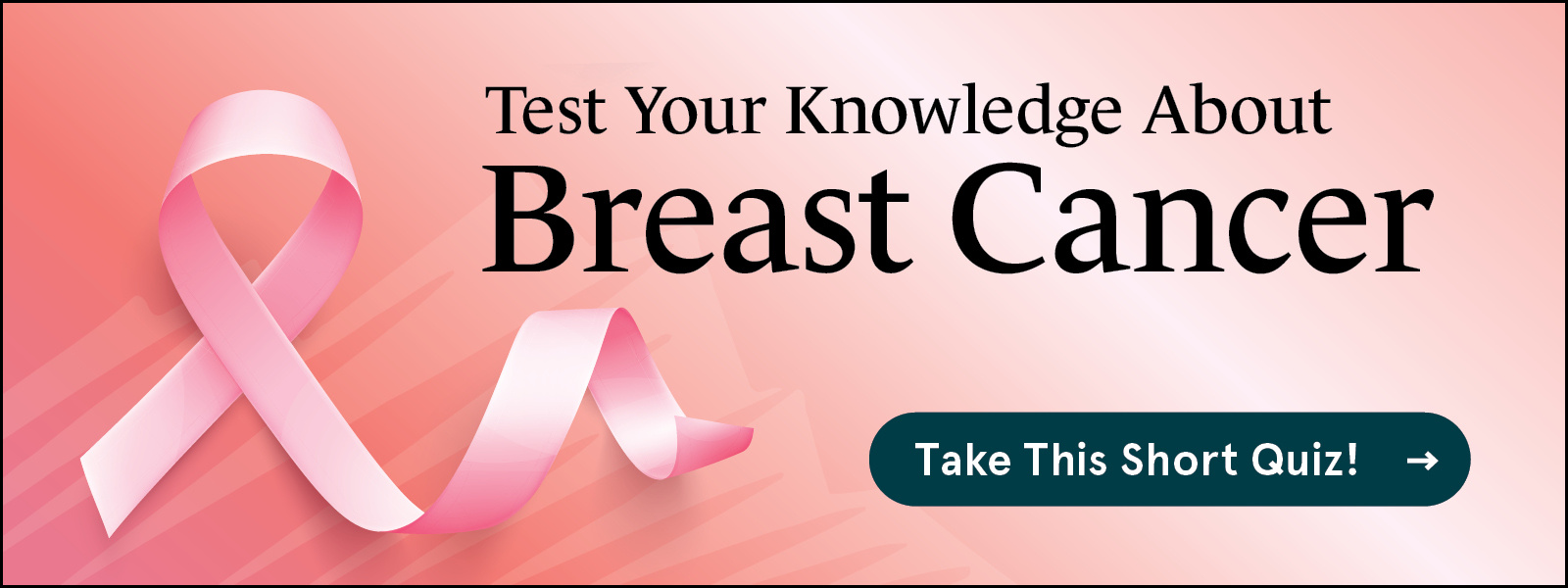What is Triple-Negative Breast Cancer?
5 min read

There are several types of breast cancer, each one with a different primary treatment plan. That’s why your oncologist will gather important information before recommending a breast cancer treatment plan for you.
The information they need is gathered from a sample of cells taken during your breast tissue biopsy and includes grade, type, and hormone receptor status. Triple-negative breast cancer (TNBC), while rare, is one of several categories of breast cancer.
What Does Triple-Negative Refer To?
There are several tests run on biopsied breast tissue to determine which treatments are most likely to work best. The breast cancer specialist will need to know if there are hormones or proteins fueling the cancer. The breast biopsy pathology report will indicate whether the breast cancer is
- Estrogen receptor-positive (ER+) or estrogen receptor-negative (ER-)
- Progesterone receptor-positive (PR+) or progesterone receptor-negative (PR-)
- HER2 protein-positive (HER2+) or HER2 protein negative (HER2-)
Estrogen and progesterone receptor-positive results indicate that the breast cancer cells have receptors for estrogen or progesterone. It’s also possible to be positive for both estrogen and progesterone receptors. When breast cancer cells attract these hormones, the cancer is able to grow. Hormone-blocking drugs are included in the treatment process for patients who are hormone-positive.
HER2 protein is found on all cells, but if there is too much HER2 protein found on the breast cancer cells, the cancer cells are able to quickly divide and grow. A targeted therapy is typically used to counter the overgrowth of the HER2 protein, slowing the cancer’s ability to grow.
It’s possible to have triple-positive breast cancer. This means that there are receptors for estrogen and progesterone as well as an overgrowth of the HER2 protein.
Triple-negative breast cancer doesn’t show hormone receptors on the cancer cells and most likely won’t respond to breast cancer treatments using hormone blockers to slow the growth of cancer cells, like many other types of breast cancer. It also won’t be likely to respond to the targeted therapy for HER2 protein overgrowth.
How Common is Triple-Negative Breast Cancer and Who Gets It?
About 10 to 20% of breast cancers are found to be triple-negative. However, triple-negative cancer cells are found more often in people under the age of 50. This is about 10 years younger than the average age of 60 or older for other types of breast cancer diagnoses. Triple-negative breast cancer is also found in higher percentages of Black and Hispanic patients and less often in Asian and non-Hispanic patients.
Another population that is more likely to be diagnosed with this type of breast cancer has an inherited mutation of the BRCA gene. About 70% of those with triple-negative breast cancer also test positive for having the BRCA mutation. You may qualify for genetic testing based on your family history. Learn more about genetic testing for breast cancer.
Survival Rate for Patients with Triple-Negative Breast Cancer
Triple-negative breast cancer is considered aggressive, or fast-growing, but it is treatable. Survival depends on factors such as how advanced the cancer was at diagnosis, your overall health, and your response to treatment.
Across all stages of triple-negative breast cancer, the 5-year survival rate is about 77%. Keep in mind that most triple-negative breast cancers are stage 3 when found which is typically considered “regional.” Localized breast cancer refers to stage 1 and usually stage 2. Distant breast cancer is stage 4 which means it’s developed in other areas of the body in addition to the breast.
The American Cancer Society lists the five-year relative survival rates as:
- Localized: 91%
- Regional: 66%
- Distant: 12%
It’s important to note that the survival rates may be higher than this data suggests because new treatments are becoming available through clinical research.
Related Read: One Woman's Journey Through Triple Negative Breast Cancer Treatment
Treatment Options for Triple-Negative Breast Cancer
Extensive breast cancer research and clinical trials have produced a treatment recommendation that’s more specific to triple-negative breast cancer than has ever been available before.
Local and Regional Triple-Negative Breast Cancer Treatment Options
If triple-negative breast cancer is diagnosed at stage 1, 2, or 3, most patients will have surgery, chemo, and radiation therapy. There are some recent advances in targeted therapy and immunotherapy that may also be included in the treatment plan.
Surgery Before Other Breast Cancer Treatments
If the triple-negative breast cancer is small enough to be removed with surgery, a lumpectomy or mastectomy may be performed to remove the cancer before other treatments. If the TNBC was large, or found in the lymph nodes, radiation therapy is likely to be recommended to be sure any cancer cells left in the breast or nearby area are destroyed.
For women who have tested positive for the hereditary BRCA1 or BRCA2 gene mutation, an additional treatment may be added. This is a targeted therapy that can be given up to a year after chemo is complete to extend the life of the patient.
When Surgery is Not Performed First at Stages 1-3
If the cancer is large or has spread to the lymph nodes, the breast cancer specialist may suggest chemotherapy, sometimes combined with immunotherapy, to reduce the cancer before surgery is performed.
The immunotherapy used with TNBC is a relatively new option with extensive research still underway. Immunotherapy can boost the patient’s own immune system to recognize and destroy cancer cells. Without it, the cancer cells are often able to trick the body into thinking they are healthy. Immunotherapy typically works on specific proteins involved in the immune system to enhance the immune response.
Stage IV (Distant) Triple-Negative Breast Cancer Treatments
Surgery and radiation therapy are used less often for stage 4 TNBC but may still be an option for some patients. Chemotherapy is often used and it can be combined with a targeted therapy for those who are BRCA positive, or an immunotherapy if there is an excess of PD-L1 protein found on the tumor.
What Type of Surgery Should be Used for Triple-Negative Breast Cancer?
Both lumpectomy and mastectomy are used for patients with triple-negative breast cancer depending on the size of the tumor and its location. However, TNBC is more common among those who also have the BRCA gene mutation. Because of this, your breast cancer care team may discuss the option of removing both breasts at the same time. This is because breast cancer is more likely to return in the other breast compared to patients without the BRCA gene mutation.
Learn more about breast cancer surgery.
You and your breast cancer surgeon will discuss options and explore your feelings about the various choices before making a final decision.
New Triple-Negative Breast Cancer Treatments are Being Introduced through Clinical Research in Colorado
If you or someone you know has been diagnosed with triple-negative breast cancer, there are several treatments available. There are also several clinical trials running to test new therapies and combinations of therapies so that a more defined treatment path can be created for this type of breast cancer.
If you have received a TNBC diagnosis, request an appointment to meet with one of our breast cancer specialists located in the Denver area, Colorado Springs, Longmont, Boulder, and other areas throughout the Colorado Front Range. We can quickly schedule a consultation for your first or second opinion about the best path forward.
Updated November 2023



